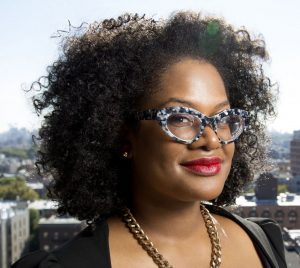 When Kathryn Finney joined a tech accelerator in 2009, she saw first-hand evidence of a pattern that makes it harder for women of color to receive the support and funding they need to build successful ventures. She made it her mission to disrupt that paradigm. Through her evolving career as an entrepreneur, founder, speaker, consultant, and investor, Finney has become one of the most respected voices on inclusivity in the tech space.
When Kathryn Finney joined a tech accelerator in 2009, she saw first-hand evidence of a pattern that makes it harder for women of color to receive the support and funding they need to build successful ventures. She made it her mission to disrupt that paradigm. Through her evolving career as an entrepreneur, founder, speaker, consultant, and investor, Finney has become one of the most respected voices on inclusivity in the tech space.
As Founder and Managing Director of digitalundivided, Finney is working towards a goal to double the number of Black and Latina women entrepreneurs who raise outside investment by 2020. digitalundivided has received widespread attention for their #ProjectDiane research study. To quantify the problem of inequality in today’s tech space for the first time ever #ProjectDiane examined over 60,000 startups. The data revealed that Black women raise an average of $36,000 for their startups, while (mostly white, mostly, male led) startups raise on average $1.3M. digitalundivided’s new initiative, The BIG Innovation Center, was designed to solve the problem enumerated by #ProjectDiane. Opening this summer in Atlanta, BIG includes a 16-week accelerator developed by Black and Latina founders for high-potential startups led by women of color.
Finney first appeared at the Social Capital Markets conference in 2014 as a SOCAP Social Entrepreneur. She recently sat down with us to discuss her efforts to quantify and solve the problem of racial and gender inequality in tech.
SOCAP: #ProjectDiane highlights the fact that 80% of new women-led businesses are founded by Black and Latina women, yet only .2% of venture funding goes to those businesses. What steps must be taken now to begin bringing equality to the tech space?
Kathryn Finney: When I went to SOCAP in 2014 I had lots of great talks with attendees from major foundations and impact investing communities, explaining the challenges in terms of fundraising and support for Black and Latina women in tech. Many responded by asking, “OK, how bad is it?” And I couldn’t quantify it. So we went to look for data and we found that no one had thought to record or amass that information, which we thought was fascinating and reminded me of a situation during my beginning career as an epidemiologist. I did my thesis research in South Africa, working with women with HIV and AIDS, and when I went to the Department of Health to ask for pre-1990 health data on the African population of South Africa they didn’t have any. 80% of South Africans are Africans. Imagine not having health data on 80% of your country. The reason? No one had thought to record it. It was the same in tech. If no one thinks to record the data then you can’t quantify the problem. You can ignore a problem if you don’t have the numbers. In South Africa, people did not find that population valuable enough to record. It is ironic that in tech, an industry that is so data centric, that we found the same problem.
So digitalundivided did necessary primary research and recorded not only the number of black women led startups, but also to questions such as where are they located? Where did they go to school? What are their networks like? Who funds them? How much funding are they getting? Really basic information that should have been available. But it wasn’t.
We found three primary reasons why black women founders are not doing as well: lack of training, lack of networks, and lack of capital. There were only 88 black women founders when we first did the study. There are more now but not many more. So from that we thought, where do we go from here? What can we do as an organization? What changes need to happen on a global level?
We found that, if there is going to be any change, it has to come from foundations, governments, and groups that really care about these populations. Change must come from people that care about the economic growth and development of the communities these women come from. We found that tech does not care enough to create change, mostly because the market isn’t demanding a change and there are no repercussions if they don’t increase inclusivity. But government and foundations that are focused on economic growth and supporting women do care. And if there is going to be any change is has to start with those people.
What are some of your other recommendations?
For instance, foundations, which I know are a large part of the SOCAP community, invest in venture funds. As an LP in a venture fund you can decide to only invest in funds that have made active investments in diverse people. The next time a VC comes to try to get your foundation to invest in their fund ask them, “how many women partners do you have? How many people of color are partners? How many women-led businesses have you invested in?” These are really simple questions you can ask before you invest. Foundations can make a commitment, and announce that commitment, to only invest in firms that are diverse. If a couple of big foundations do that we are going to see a massive change in the venture world. Especially now that venture funds are becoming harder to raise.
There are a number of new venture funds that are led by people of color. We have one that we work with called Harriet Fund that is led by myself and Gayle Jennings-O’Byrne. There is the Impact America Fund led by Kesha Cash. Foundations can decide to commit a certain percentage of their total investments to those funds exclusively. I think that is something really direct and straightforward that foundations can do that addresses the capital issue.
Another suggestion is investing dollars in programs that can produce the desired result. One of the things that we have found is because tech and STEM have become the hot new thing, that there have been organizations that have been working in other areas that are now trying to do tech. You can’t teach someone to program if you don’t know how to program yourself. Traditional workforce development does not work. You actually have to have that skillset. So we see a lot of our foundation partners and friends investing in programs that don’t have the skillset to accomplish the goals for impact. And so, before committing any dollars, foundations need to research whether an organization really has the skillset necessary to get the desired result.
#ProjectDiane quantified the problem and digitalundivided developed the BIG Innovation Center and the BIG accelerator program in response. How did #ProjectDiane data shape the solutions you are putting into practice now?
Quantifying the problem really helped us figure out the solutions. We also realized there is a strong need for role modelling and visioning. That’s how we came up with the idea for BIG Innovation Center.
By calling it BIG we are giving people permission to think big. That was deliberate. Because when people start thinking big, they start becoming big. There are a lot of innovation spaces where you will never see a person of color. It is because those spaces are not necessarily conducive to building a diverse community.
The BIG Accelerator Program addresses the networking and training part of the problem too. Our accelerator will accept up to seven startups led by Black and Latina women. The companies have to be investable and scalable and we are looking for people who are addressing real needs in our community. We believe that there are market opportunities for people who are addressing those real needs.
We are really excited because we’ve had a lot of interest in the program and some of the ideas have been quite interesting. A number of the ideas have focused on the unbanked. That is a particular interest for us because our community suffers from predatory lending and check cashing places that are unsafe and charge huge fees. If someone could come up with something that would be better and disrupt that, it not only would that be a great business, but also a great service for our community.
Harriet Fund and Harriet Angels Syndicate address the capital. Harriet Angels Syndicate is also led by myself and Gayle Jennings-O’Byrne. We have 13 angels so far. At least seven are black women. Over 50% are new angel investors that we helped get through the accreditation process.
We realized that in order to address the capital issue, our solutions must be intertwined. You can create new businesses and that is great. But if you cannot get them funding, they are not going to be able to succeed. We have worked really hard to develop the angels syndicate, and we have another ten in the pipeline getting accredited. Most of them are new investors, people we have brought into the investment space. Our Harriet Fund is the traditional venture fund. That we are raising to make a larger investment in companies that successfully graduate from the program.
What call to action would you issue to the SOCAP community?
Be open to new ways of doing things. Be open to innovation. Support programs that are pushing boundaries and changing ways of thinking. We are so fortunate that we have visionary partners like Surdna Foundation, Wells Fargo, Small Business Administration, and Echoing Green who have been amazing.
What is inspiring you in 2016. What is giving you hope for the future?
That would be my baby. When you have a child, you start to see things for the first time again too. Everything fascinates him. Everything. It helps you see the beauty in the world that you often forget when you are an adult. You forget what a great world we do live in and what a blessing it is to be here and to experience it.
Apply to be part of digitalundivided’s 2016 BIG ATL Accelerator cohort. Applications are due July 31, 2016.
If you have any questions regarding BIG Accelerator or application process, please email talk@digitalundivided.com.
Resources
Get the full #ProjectDiane report.
Read Kathryn Finney’s Echoing Green 2016 Global Fellow profile.
Follow @KathrynFinney on Twitter.
Kathryn Finney’s Medium article It’s Time to Innovate Inclusion: The #ProjectDiane Report is here) details some of digitalundivided’s data on the undercapitalization of startups led by African American women.
Read Fast Company’s article Inside the Campaign To Disrupt Tech’s Huge Diversity Problem
Kathryn Finney’s essay for SOCAP14 digitalundivided: Creating Successful Urban Tech Entrepreneurs



